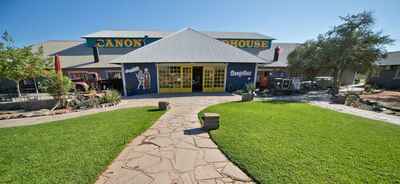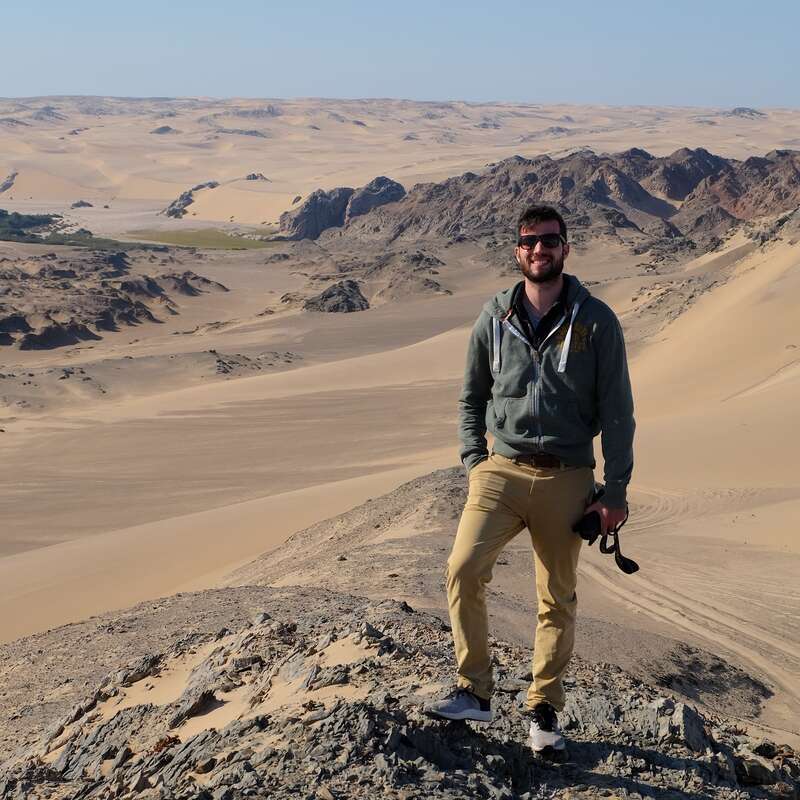About Canyon Roadhouse
Canyon Roadhouse (previously known as Canon or Cañon Roadhouse), stands 25km from Namibia’s Fish River Canyon ...
... within the 1,270km² Gondwana Canyon Park. With a fun and quirky design inspired by 1950s’ American diners, Roadhouse makes a convenient base for visiting the canyon, as well as a good pitstop en-route, with a fuel station and extensive all-day food menu.
Although its a little way from the Fish River Canyon, Canyon Roadhouse is still a good, relatively inexpensive choice for exploring this area. It is a quirky, informal and relaxed lodge with attentive staff, where time seems to stand still.
Accommodation
24 rooms
Children
Fine for all ages
Open
All year
Activities

4WD Safari

Guided walking safari

Private activities

Self-guided walking
Traveller reviews of Canyon Roadhouse
36 real, un-edited reviews from Expert Africa's travellers.
Arrived 3 Sep 2024, 2 nights
"Canyon Roadhouse review"
Overall rating: Good
Arrived 27 May 2024, 3 nights
"Canyon Roadhouse review"
Overall rating: Excellent
Arrived 9 Oct 2019, 1 nights
"Surprising decor with old vehicles"
Overall rating: Good
Arrived 27 Sep 2019, 2 nights
"Canyon Roadhouse review"
Overall rating: Excellent
Arrived 10 Apr 2019, 2 nights
"Canyon Roadhouse review"
Overall rating: Good
Arrived 22 Jun 2018, 2 nights
"Good time at Canyon Roadhouse"
Overall rating: Good
Arrived 30 Dec 2017, 2 nights
"Quirky and a fun place to stay!"
Overall rating: Excellent
Arrived 2 Jan 2018, 2 nights
"Different"
Overall rating: Good
Arrived 29 Oct 2017, 2 nights
"Quirky"
Overall rating: Good
Arrived 9 Sep 2017, 2 nights
"Quirky place to stay- good fun!"
Overall rating: Good
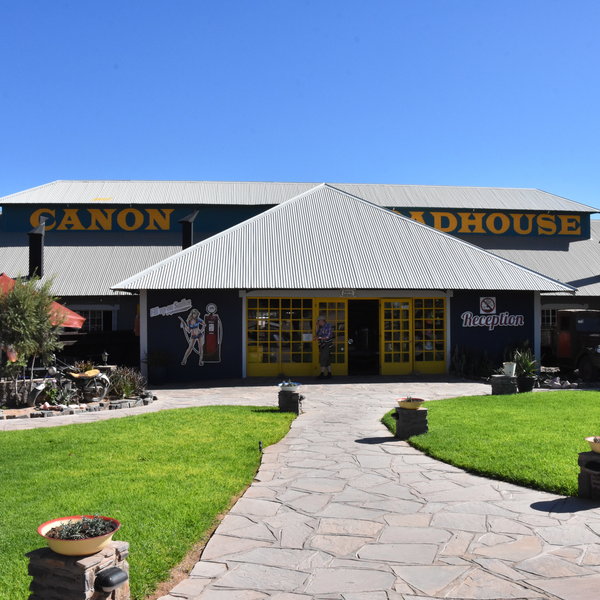

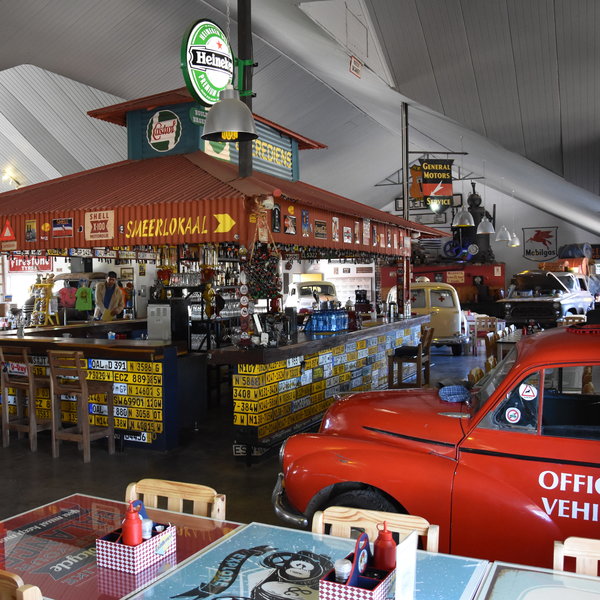
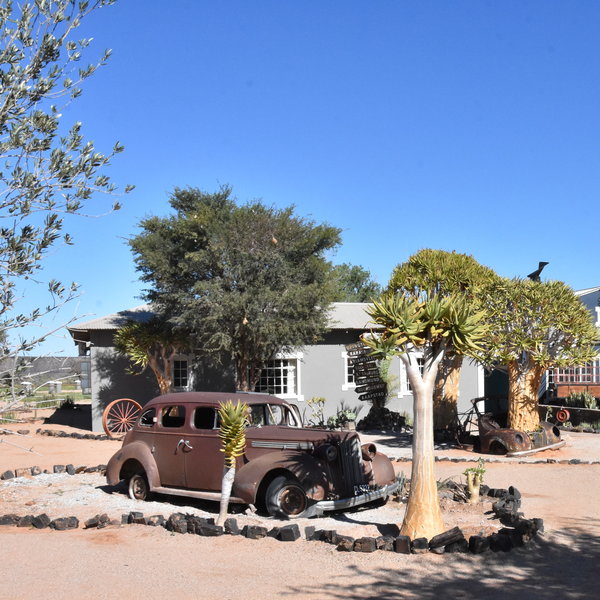
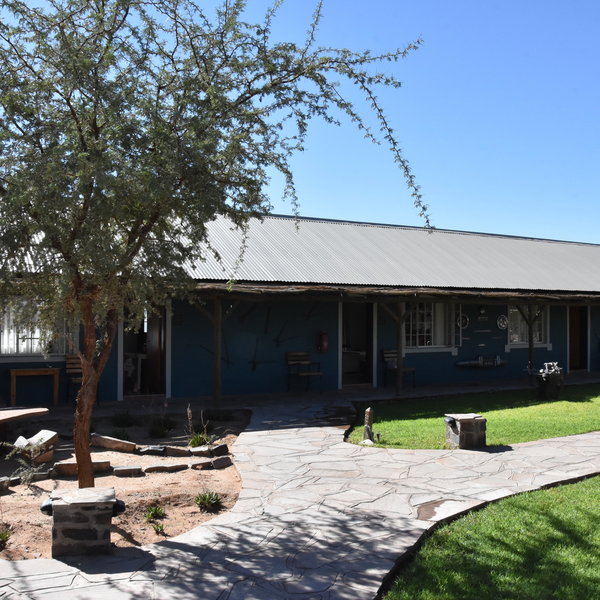
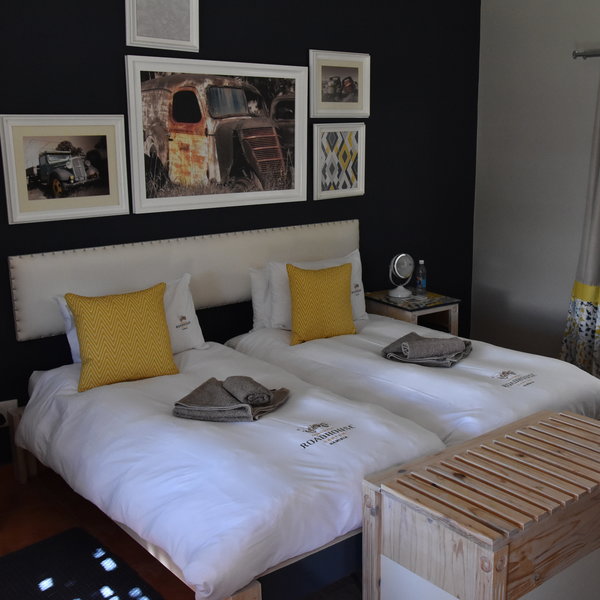
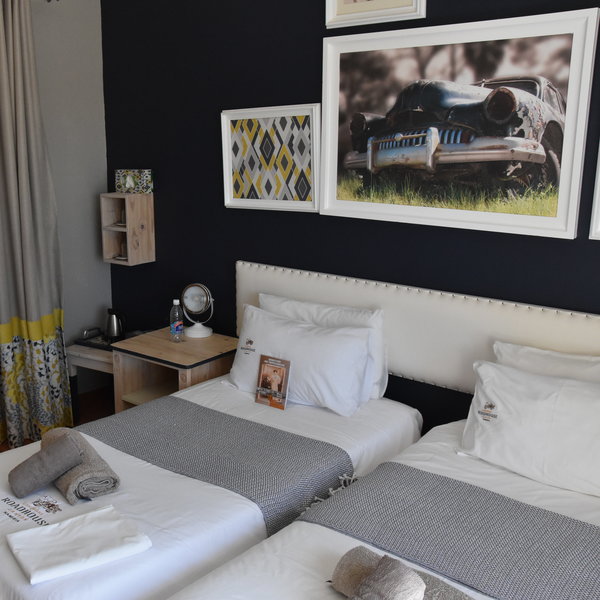
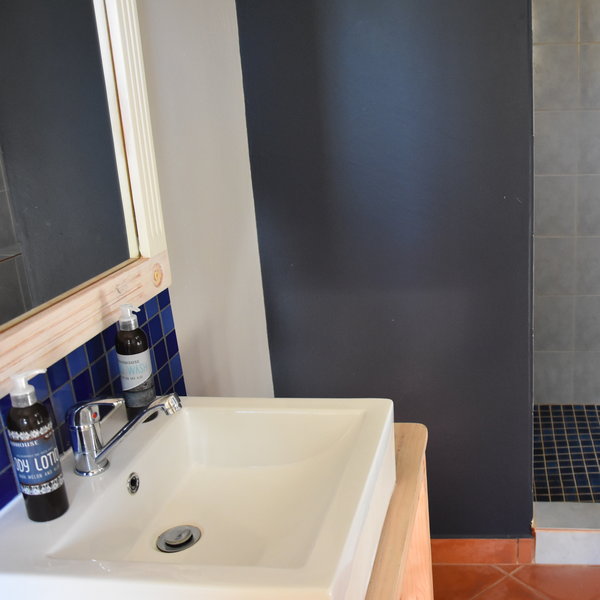
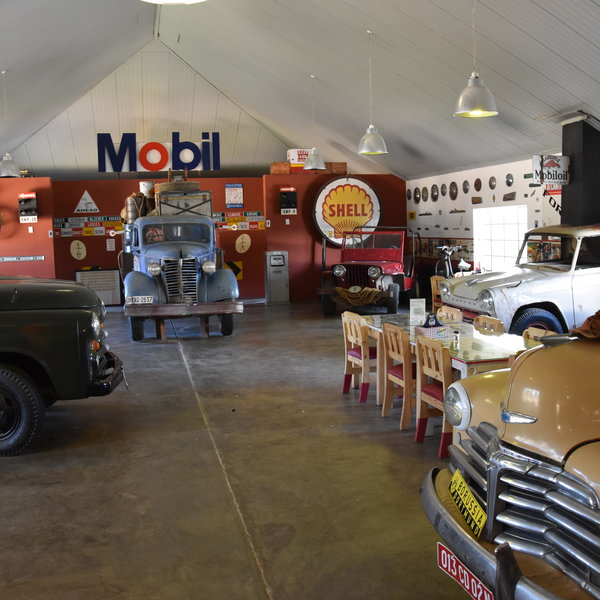
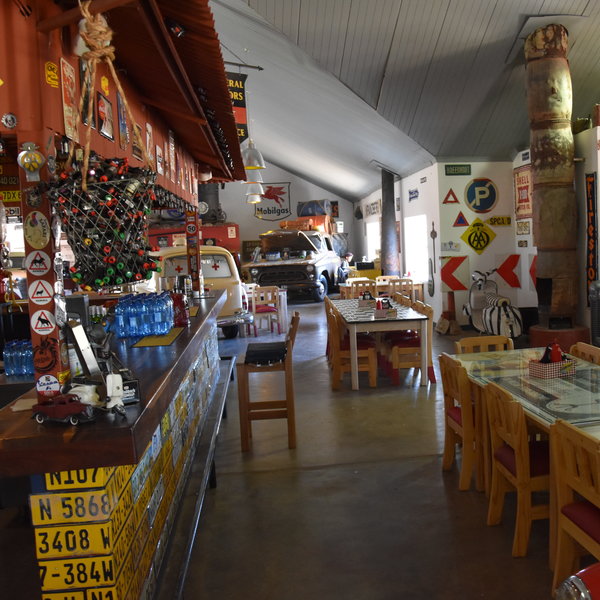
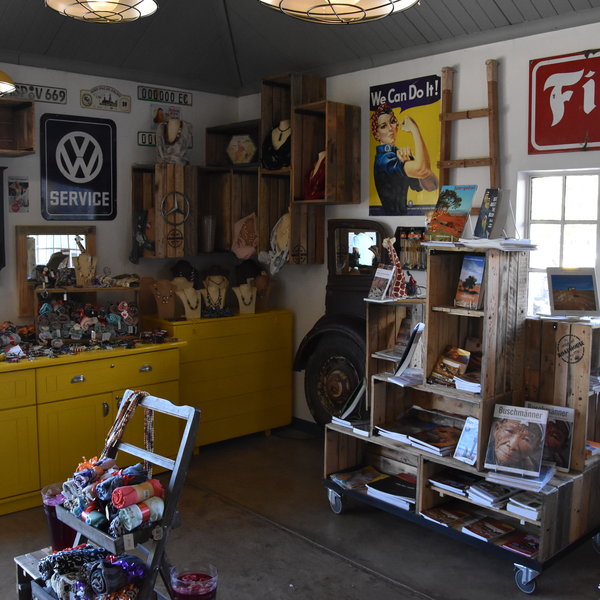
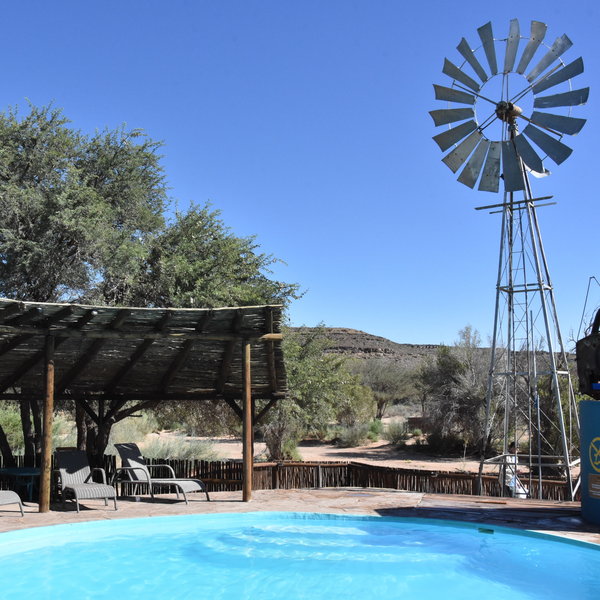
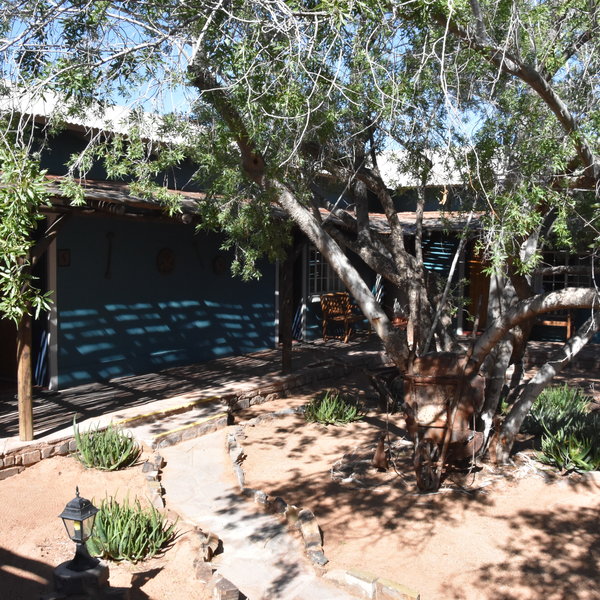
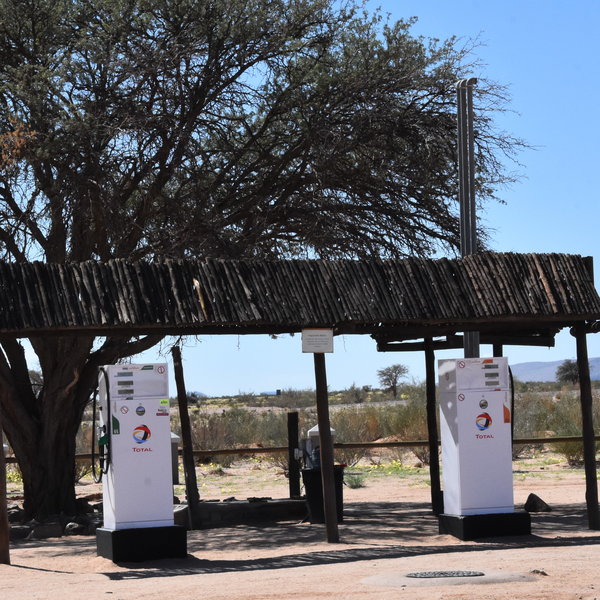
Expert Africa's gallery
When we travel we take lots of photos ourselves to give you a real and un-edited view of the safaris. See our 23 pictures and 1 videos of Canyon Roadhouse to get the candid view.
View galleryCanyon Roadhouse: Our full report
Canyon Roadhouse (previously known as Canon or Cañon Roadhouse), stands 25km from Namibia’s Fish River Canyon ...
... within the 1,270km² Gondwana Canyon Park. With a fun and quirky design inspired by 1950s’ American diners, Roadhouse makes a convenient base for visiting the canyon, as well as a good pitstop en-route, with a fuel station and extensive all-day food menu.
Of the three properties within Gondwana Cayon Park, which also include Canyon Lodge and Canyon Village, Canyon Roadhouse was our favourite on our last visit in May 2018.
The 24 en-suite rooms here are built in blocks around a couple of small courtyard gardens featuring desert-adapted plants such as the mopane aloe, Euphorbia gregaria, and small quiver trees. Simply furnished, yet cool, light and comfortable, all the standard rooms have twin beds beneath a large mosquito net, a small table and chair, and a low armchair. Air conditioning, electronic safes and tea- and coffee-making facilities are useful extras. Bathrooms have a flush toilet, hot/cold shower and a washbasin with a mirror above it. Because the rooms share internal walls, you do hear quite a lot of noise from the adjoining rooms and their plumbing.
Furnished and equipped in similar style to the standard rooms are two spacious family rooms where you’ll find another single bed, with the option of a fourth bed on request.
Canyon Roadhouse has no separate lounge area, but there's plenty of seating in the imaginative and very quirky restaurant, which is filled with old cars, trucks and car parts. Look around and you'll spot some wonderful finds from yesteryear, such as a beaten copper kettle on an old gas-burning stove, as well as some newer yet still surprising features. Sit indoors or outside on the patio, depending on the weather, or head for a stool at the nearby bar. There is free WiFi throughout and a large shop with a wide selection of African curios and a handy ATM.
On our last visit we took advantage of the facilities at Roadhouse, as many passing travellers do, to re-fuel our car and enjoy a superb milkshake from the kitchen. It is certainly a convenient stop in a remote part of the country, and although this can lead to it feeling quite busy during the day, we felt that this suits the lodge’s buzzy vibe.
Like the rest of the lodges in the Gondwana Collection, Roadhouse is conscious of reducing waste, and recycles its water to tend the garden. It also has its own small vegetable and herb garden, used in preparation of meals..
The swimming pool is a short walk from the main lodge, up a few steps. From its slightly raised vantage point above the surrounding natural bush, you can swim or relax on a sunlounger while taking in the scenery.
Guests at Canyon Roadhouse can explore the surrounding area in their own vehicle (conveniently, the lodge has a small fuel station), but if you prefer, you can take part in various organised activities. Often taken in conjunction with guests from its sister properties, Canyon Village and Canyon Lodge, these include morning or afternoon nature drives with one of the lodge's guides, sundowner drives and self-guided walking trails.
Activities
4WD Safari
Guided walking safari
Private activities
Self-guided walking
Families & children
- Attitude towards children
- Children are welcome at Canyon Roadhouse
- Property’s age restrictions
- None
- Special activities & services
- There are no specific activities here for children, but the lodge does have a lovely big pool.
- Equipment
- Canyon Roadhouse has cots and highchairs for children which can be arranged on request.
- Generally recommended for children
- We felt the informal atmosphere would suit families with young children well.
- Notes
- Children must be kept under parental supervision at all times, not least as the pool is unfenced and with no lifeguard.
Food & drink
- Usual board basis
- Bed & Breakfast
- Food quality
- Although we didn’t have time to eat here on our last visit in May 2018 we thoroughly enjoyed our milkshakes, and on previous occasions have been impressed by the food here. The kitchen is generally able to cater for specialist dietary needs provided adequate notice is given.
The breakfast buffet incorporates cereals, fruits and a full English breakfast, plus fruit juices, coffee and tea.
Lunch and dinner are both informal meals, served from an extensive and varied diner-inspired à la carte menu. In May 2016, we enjoyed a cheese-and-tomato toastie with chips and salad from a light snack menu for lunch. At dinner , we opted for a huge hake fillet with rice, and a delicious chocolate cake for dessert. - Dining style
- Individual Tables
- Dining locations
- Indoor and Outdoor Dining
- Further dining info, including room service
- None
- Drinks included
- Drinks are at an extra charge, to be paid at the lodge.
Our travellers’ wildlife sightings from Canyon Roadhouse
Since mid-2018, many of our travellers who stayed at Canyon Roadhouse have kindly recorded their wildlife sightings and shared them with us. The results are below. Click an animal to see more, and here to see more on our methodology.

75% success

33% success

0% success

0% success

0% success

0% success

0% success
Getting there
- Location
- Fish River Canyon, Namibia
- Ideal length of stay
- 2-3 nights
- Directions
- Canyon Roadhouse is 15km along the C37 (the main gravel road leading to Hobas and the Fish River Canyon) and is clearly signposted in bold white paint on a rusted old pick-up truck.
Guests arriving by air will land at Canyon Lodge airstrip, just 8km away. - Accessible by
- Self-drive or Fly-and-Transfer
Sustainability
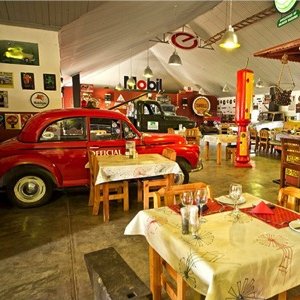
Finding creative new uses for recyclable items
Situated within the scenic Gondwana Canyon Park, visitors to Canyon Roadhouse can admire an environment restored to its former self through income generated from the lodge. As part of the leading brand in Namibian eco-tourism, The Gondwana Collection, Canyon Roadhouse’s sustainability efforts can be mostly seen it its innovative and creative approach towards solid waste recycling.
The lodge’s use of vintage ‘wheelers’ as décor is a recycling initiative aimed at celebrating the region’s driving heritage, and includes fireplaces made from vintage cabs and a truck reception desk. Additionally, waste not reused is sorted and sent for recycling. Most recently, glass waste is collected and put through new glass crushing machines able to grind an estimated 120-150kg of glass an hour into sand. This can be further used for making bricks or as a mixture with cement from which items such as table tops and tiles can re-used or sold. Through this initiative, the park hopes to become self-sufficient when conducting small construction work projects. Furthermore, Canyon Roadhouse hopes to be able to use the glass crusher technology as an income generator for disadvantaged and marginalized communities in neighboring areas.
With a constant commitment to sustainable operations, it is therefore no surprise that Canyon Roadhouse holds the highest accreditation by Eco Awards Namibia, together with a Fair Trade Tourism certification.
See more great sustainability projects in Namibia
Communications
- Power supply notes
- There is a generator back-up incase of mains power failure.
- Communications
- Guests can make telephone calls via the internet using phone cards, which are sold at the lodge. There is free WiFi in the main areas.
- TV & radio
- There is no TV or radio
- Water supply
- Borehole
- Water supply notes
- All bathrooms have plentiful hot running water and flush toilets.
Health & safety
- Malarial protection recommended
- No
- Medical care
- The nearest doctor is in Keetmanshoop, but in an emergency guests will be flown to Windhoek.
- Dangerous animals
- Low Risk
- Security measures
- There are no security guards on duty.
- Fire safety
- There are no fire extinguishers in the rooms, but we were told that they are located near the office and main lodge area.
Useful info
- Disabled access
- On Request
- Laundry facilities
- Laundry service is possible for an extra charge.
- Money
- There are small safes in each of the rooms.
- Accepted payment on location
- You can use both Visa and Mastercard here, as well as Namibian dollars or South Africa rand in cash. Travellers' cheques in South African rand are also accepted.
Plan and book your trip with Expert Africa
All of our trips are tailor-made, so we'll always adapt them to suit you. Talk to an Expert and let us plan and arrange your perfect trip.

Talk to an Expert
Call or email us now! We’ll match you with the Specialist in our team who is best suited to help you. Then together we can start planning your trip.

Set up your itinerary
Based on our experience and your ideas, your specialist will create a detailed, costed itinerary. We’ll refine it together, until we have a trip that you’re perfectly happy with.

Prepare for your trip
The same Specialist will make the seamless arrangements for your trip, send you detailed travel documents, and be available to answer any questions before you depart.

Travel with peace of mind
After you set off, you’ll be cared for by our partners in Africa, most of whom have worked with Expert Africa for decades. And if you ever need us urgently, we’re available 24/7.

When you return
We love to learn about your trip, and so will always be grateful if you’ve the time to give feedback to your Specialist when you return.
Canyon Roadhouse's location
Look closer at the environment and surroundings of Canyon Roadhouse.
Other lodges in Fish River Canyon
Alternative places to stay in this same area.
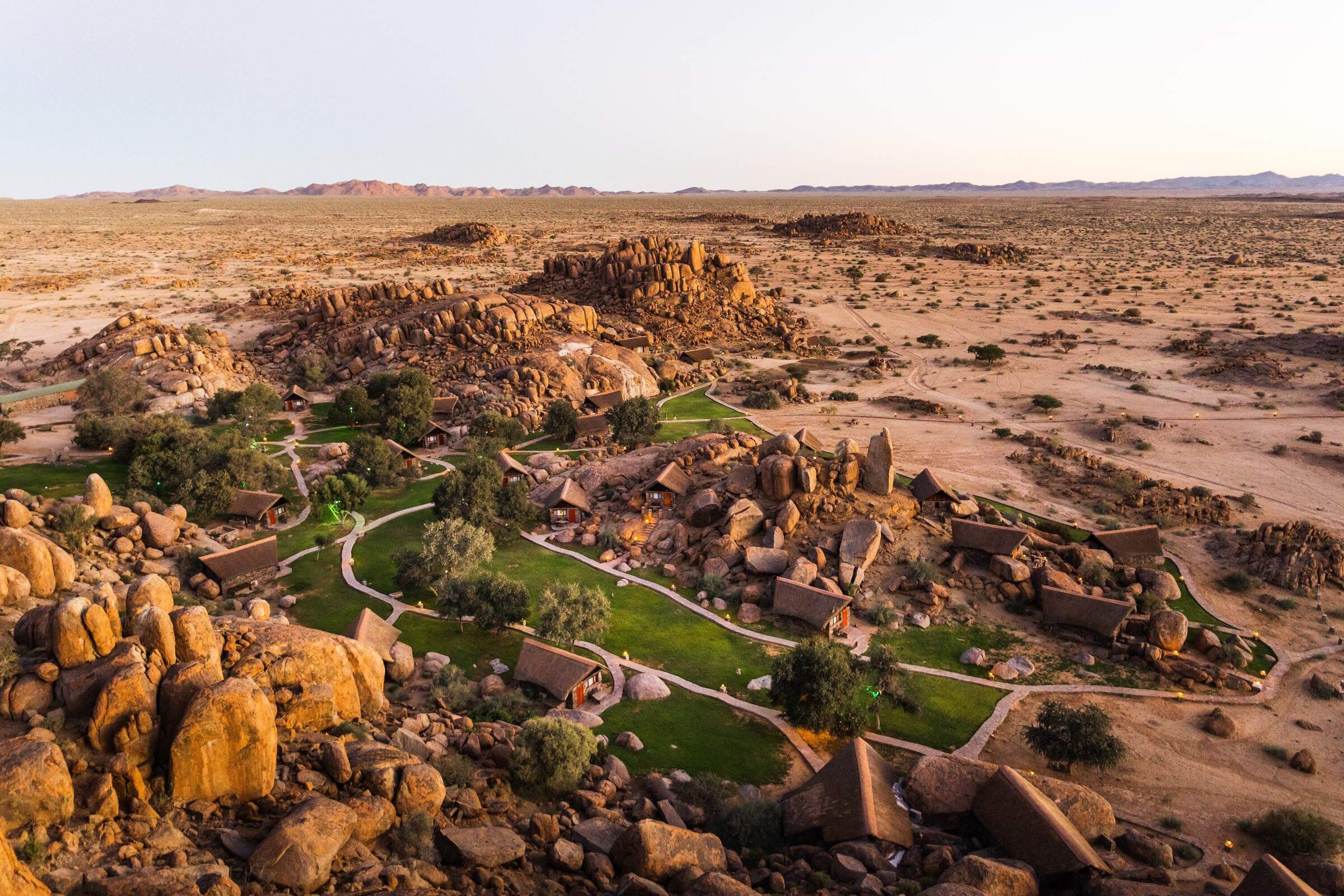
Canyon Lodge
Just 20km from Fish River Canyon, Canyon Lodge was the first lodge in the area, with individual chalets built amongst huge granite boulders.
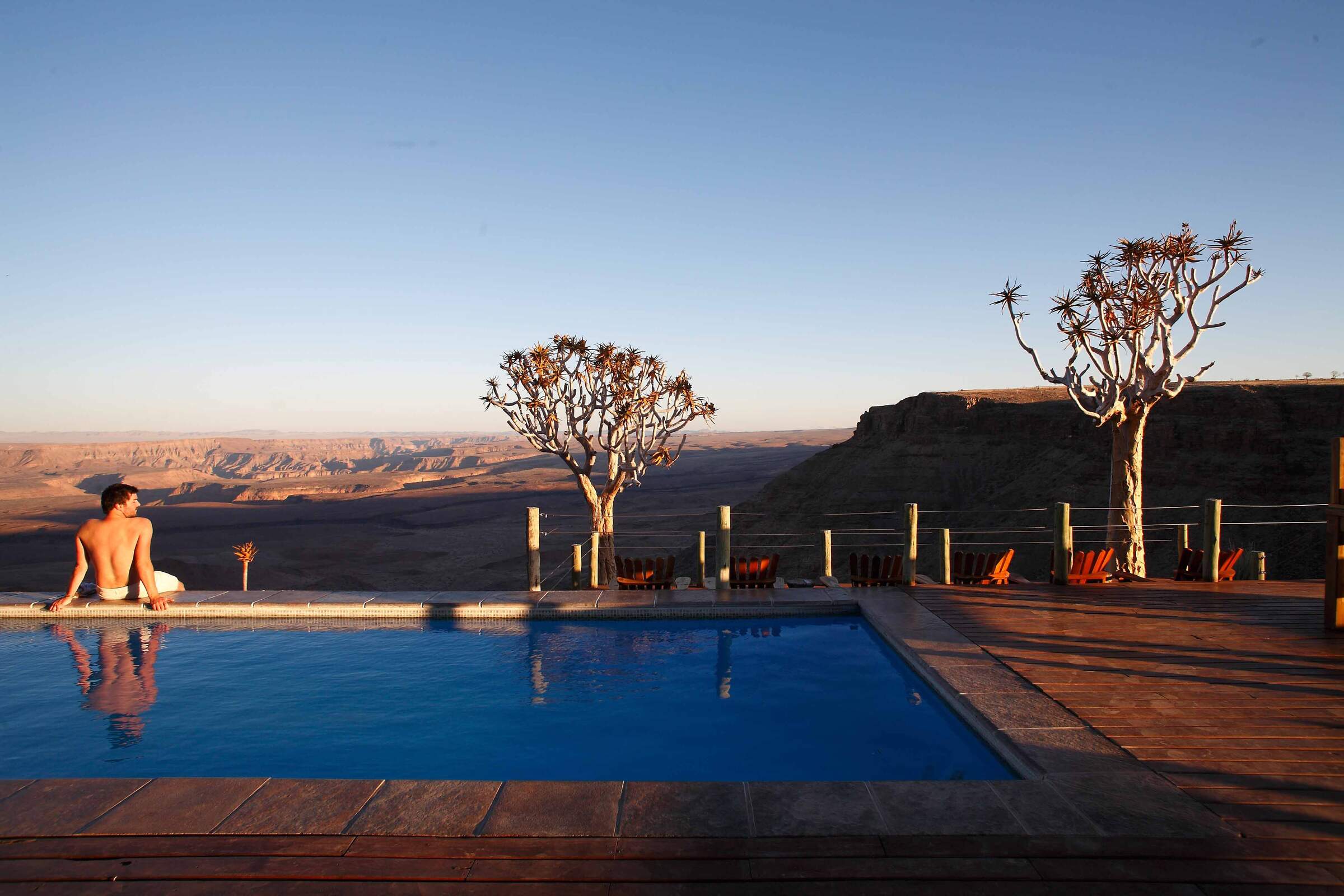
Fish River Lodge
Perched on the lip of Fish River Canyon, Fish River Lodge has some of the best views of any lodge in Namibia.
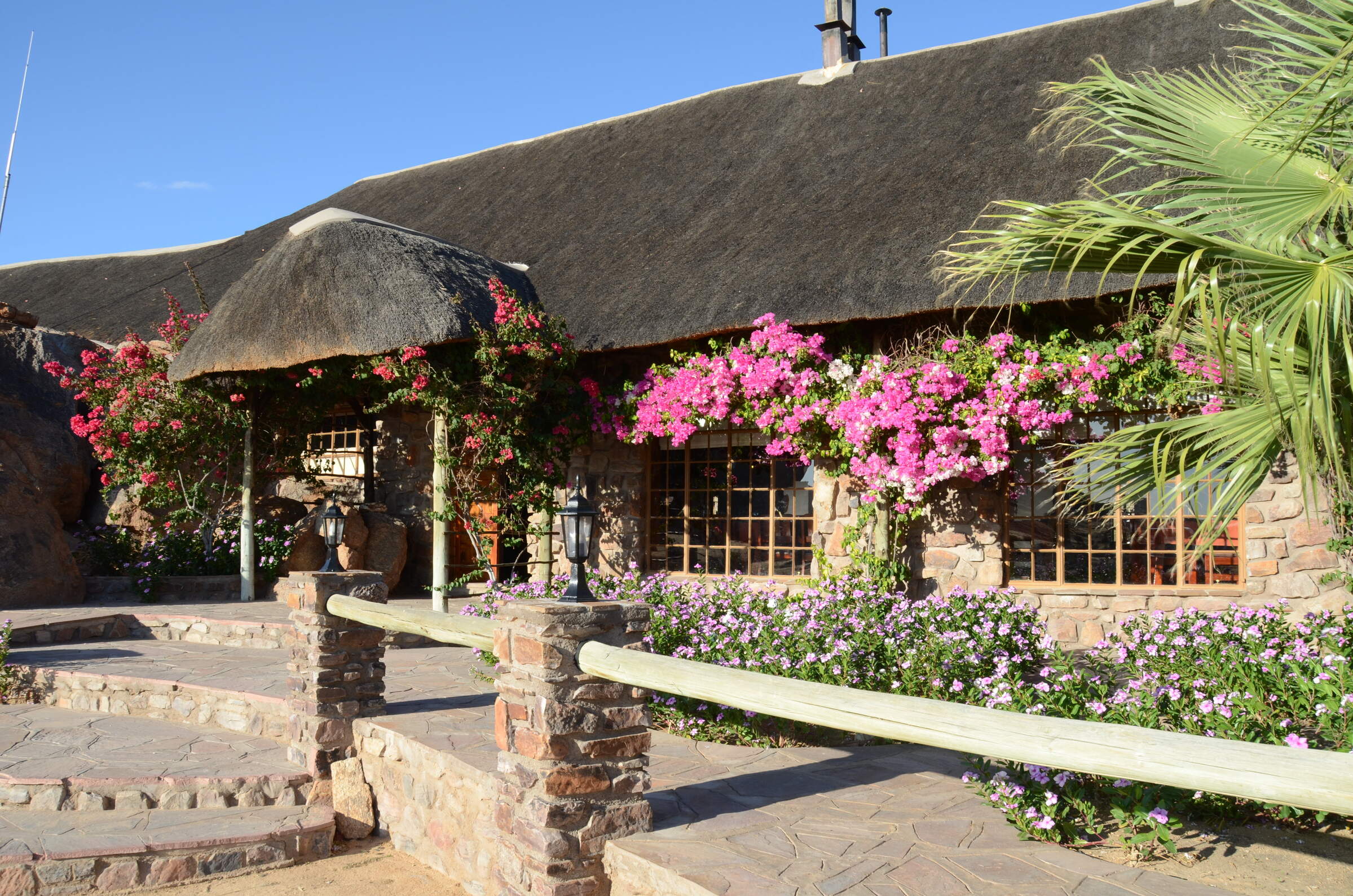
Canyon Village
Close to Fish River Canyon, the reasonably priced Canyon Village features interior walls covered in murals by Namibian artists depicting the history of the area.
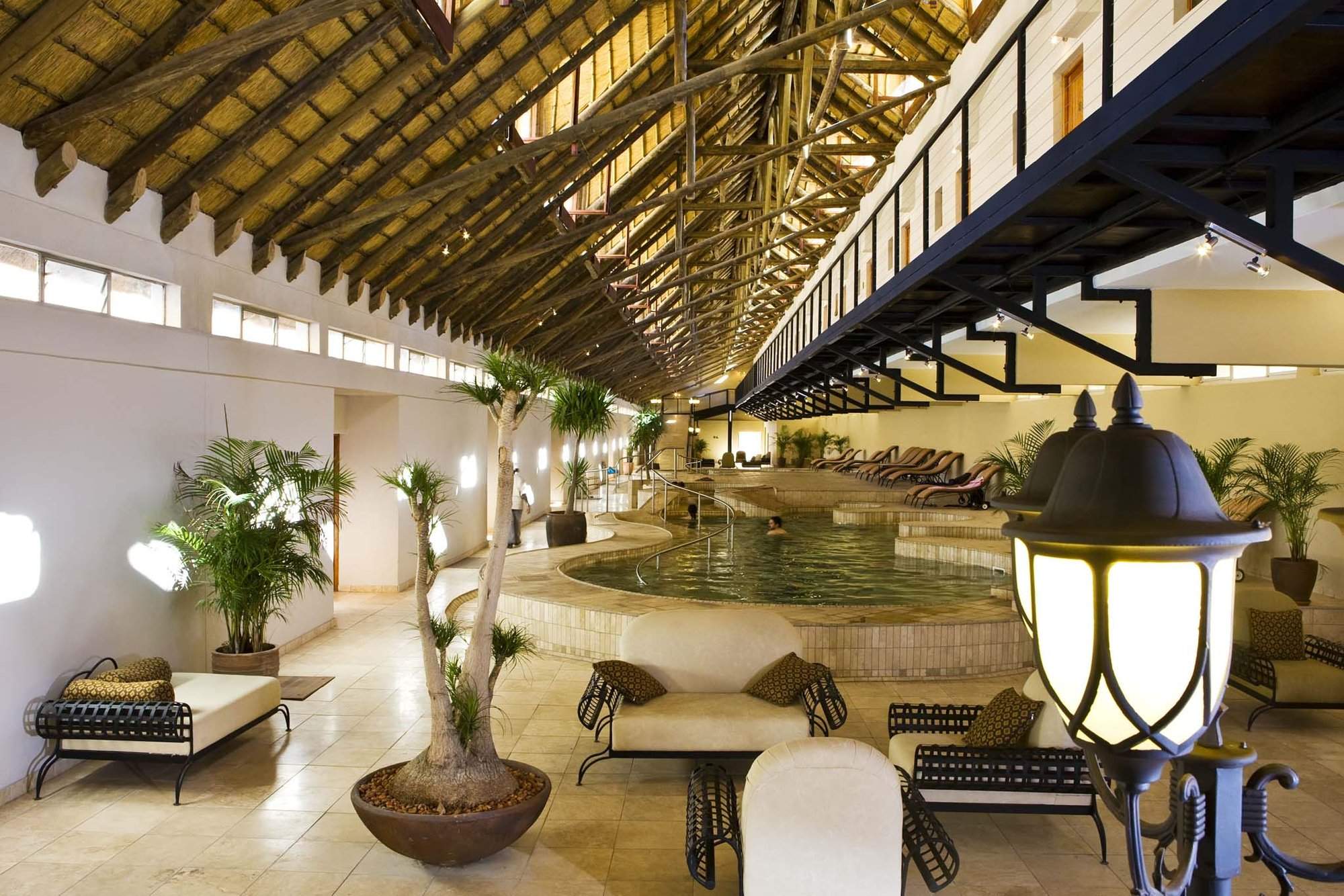
Ai-Ais Hot Springs Spa
The government-run Ai-Ais Restcamp is situated on a site of natural hot springs, down at the bottom of the Fish River Canyon.
When to go to Fish River Canyon
Our month by month guide: What it's like to visit Canyon Roadhouse in Fish River Canyon
Jan
Feb
Mar
Apr
May
Jun
Jul
Aug
Sep
Oct
Nov
Dec
Namibia in January
January is at the heart of Namibia’s rainy season. However, as you’d expect from a country dominated by desert and semi-desert environments, the rains are often (but not always) weak and usually quite localised. Some days will be clear, the strong sun raising temperatures to around 30ºC/86ºF; on others humidity and clouds build, sometimes culminating in spectacular thunderstorms. In extreme cases, these generate flash-floods which race down the beds of ephemeral rivers.
Across the country, the greening landscape makes a refreshing change, especially in desert areas. Many birds are in full breeding plumage and migrant species are here in force. In the north, where the rains are more reliable, the abundant water and food allows wildlife to disperse, making it trickier to spot.
- Variable weather: clear, hot & dry, or cloudy & humid with some rain
- Occasional, highly localised thunderstorms
- Many animals with young; birdlife at its most spectacular
- Wildlife dispersed & harder to see, especially in Etosha & the Caprivi
- Very few tourists (apart from the New Year) so rates mostly low
Our view
This is not a great time to visit
Weather in January
Namibia in February
February is the wettest month, but as Namibia is dominated by deserts, the rains are often weak and patchy. The variation in weather across Namibia is significant, too; the central highlands and Caprivi can see some heavy rain. More typically, some February days are clear with a hot, strong sun; others are cooler as cloudy skies build and, sometimes, culminate in short, spectacular thunderstorms. Occasionally these generate flash-floods, bringing ephemeral rivers to life and making travel more challenging.
Across the country, the landscape feels green and alive; insects and smaller animals are more easily seen, and many birds and animals are raising their young. However, small pools in the bush and thicker vegetation can make it hard to spot the wildlife.
- Variable weather: clear, hot & dry or cloudy & humid with some rain
- Occasional localised thunderstorms meander over the landscape
- The bush feels alive; birdlife is at its most spectacular
- Wildlife in Etosha & Caprivi is dispersed & harder to see
- Few tourists, so rates usually at their lowest
Our view
This is not a great time to visit
Weather in February
Namibia in March
March usually sees Namibia’s main rains tailing off, although actual precipitation varies hugely across the country and can be unpredictable from day to day. Many days will be clear, with a strong sun driving temperatures up. On others, clouds will build, and the late afternoon may see a short, spectacular thunderstorm. Such deluges reduce in both frequency and volume as the month progresses.
Across the country, landscapes are often vivid: a “green and pleasant land”. Many birds and animals are finishing raising their young, so smaller animals and insects are in evidence. In the north, where rains are generally heavier, pools in the bush and thicker vegetation can make it difficult to spot larger animals.
- Variable weather: clear, hot & dry or cloudy & humid with some rain
- Afternoon thunderstorms less common as March progresses
- Animals looking sleek and well-fed, after 3–4 months of plenty
- Wildlife in Etosha & Caprivi is dispersed & harder to see
- Few tourists visit during March, so rates often low
Our view
A good time to visit, with pros & cons
Weather in March
Namibia in April
Typically, April is dominated by dry weather; there’s an ever-decreasing chance of rain. Temperatures are now below their peak and continue to fall. Even so, days remain pleasant and warm, but there might be a slight chill in the air at night. The rains usually leave many parts of the country verdant and green, so animals are in fantastic condition – often with fast-growing young in attendance.
With the dust washed out of the atmosphere, photographers make the most of clear air, spectacular landscapes and healthy animals. Stargazers will have clearer night skies as the month progresses. In the game parks of Northern Namibia, water and food remain in plentiful supply, so finding big game can prove trickier than later in the year.
- Becoming drier &, especially at night, also cooler
- Few visitors, except around Easter, so rates remain low
- Wildlife in Etosha & Caprivi remains relatively hard to see
- Migrant birds have started to leave
- Fresh, clean air and often green, verdant landscapes
Our view
A good time to visit, with pros & cons
Weather in April
Namibia in May
By May, Namibia is usually drying out fast as the rains have ended. If they’ve been good, then the land remains green, but wildlife starts to congregate at more permanent water sources. Over much of the country the air quality and clarity can be amazing, making this an ideal month for photography.
Typical days are warm, with crisp, clear mornings and clear blue skies. Evenings are usually cool, and temperatures may dip below 10ºC (50ºF) overnight. Many lodges still charge “low season” prices, although with Namibia’s increasing popularity in recent years, some have started to introduce higher “shoulder season” rates.
May’s good-value rates, increasingly good wildlife sightings, beautiful landscapes and crystal-clear air combine to make this one of our favourite months in Namibia.
- Lovely weather: dry, warm days & cool nights
- The country is drying out although many landscapes remain green
- Fantastic air clarity – ideal for keen photographers
- Visitor numbers are often still low, mirrored by lodge rates
- Wildlife is starting to congregate more around remaining water
Our view
A very good time to visit
Weather in May
Namibia in June
Namibia is dry again. Skies are blue and usually largely cloudless. Days are lovely: warm and dry; nights are cold, sometimes below freezing in the desert. Most swimming pools in Namibia are always outdoors, making them too cold for all except the very dedicated.
Take a warm hat and gloves for game drives, where dawn and dusk will feel particularly chilly. In the north, especially Etosha, wildlife viewing is now into its dry-season pattern, focusing around the waterholes – though the park is still not busy.
Photographers come for superb air clarity, with minimal dust or smoke in the air. Historically, June rates have been low. However, with Namibia’s increasing popularity many lodges now count it amongst their “high-season” months, and request higher prices.
- Clear, bright days with blue skies; cold nights, mornings & evenings
- Great air quality, especially welcome for photographers
- “Shoulder season” for some lodges: lodge rates moderate
- Wildlife gravitates to waterholes, making game-viewing productive
- Some greenery in the landscape, depending on the last rains
Our view
A very good time to visit
Weather in June
Namibia in July
Reliably warm daytime temperatures (upwards of 20ºC/70ºF) and good wildlife sightings make this a popular month to visit Namibia. Rain would be very unusual indeed and clear skies make for great photographs. Once the sun sets, though, temperatures cool rapidly bringing cold nights that may dip below freezing in the desert. Be prepared: dress in layers and expect early-morning and late-afternoon drives, and anywhere coastal, to be cold.
As the land dries and vegetation shrivels, game congregates beside drinking water: Etosha’s waterholes are busy with animals. Across the country, lodges charge “high season” rates; many are fully booked a year or more in advance, especially during European school holidays (from the latter half of July to late August).
- Dry days, warm in the sun, with crisp, cold nights
- Cloudless skies: July is usually superb for stargazing
- The beginning of European school holidays so more families travelling
- Peak season: so high rates and many lodges fully booked far in advance
- A fantastic time of year for wildlife watching, particularly in Etosha
Our view
A very good time to visit
Weather in July
Namibia in August
August is the height of Namibia’s “winter”. Expect cloudless skies and plenty of warm sun in the day, but nights down to freezing in the desert. Dress in layers and bring warm clothes (including hats and gloves) for chilly starts and evenings. Only the hardiest even contemplate using outdoor pools.
It’s 3–4 months since any rain, so the land is dust-dry and much vegetation is golden brown. Many landscapes appear sparse and harsh. Wildlife congregates around available water sources, helping to guarantee good animal sightings.
Namibia is never really “busy” by the standards of Europe or the USA, but August is the most popular time to visit, especially for families. Book early (over a year in advance) if you want to stay at the best lodges.
- Dry days, warm in the sun; cold mornings, evenings & nights
- Cloudless skies in the day; spectacular stars at night
- Busy by Namibian standards: family rooms in particular demand
- Peak season: so high rates and many lodges fully booked far in advance
- A fantastic time of year for wildlife watching, particularly in Etosha
Our view
Fantastic: the very best time to visit
Weather in August
Namibia in September
September is a month of blue, cloudless skies and fantastic wildlife viewing. Rain is almost unheard of. As the month progresses, the days and nights get warmer. In some areas, daily maximums hit around the low 30s Celsius, although low humidity ensures this feels comfortable. The contrast makes the nights seem very cold. The air is becoming dustier, occasionally augmented by smoke from fires – so becoming hazy for photographic purists.
In the national parks, animals congregate around remaining water sources – making September one of the best months for game viewing. Hence it’s one of Namibia’s most popular months for visitors: a “high season” month that is often the time of choice for safari aficionados.
- One of the best months for wildlife viewing
- Warm days & cold nights, with temperatures rising during the month
- Many plants have faded from green to golden brown
- Air can be hazy – with dust & sometimes smoke
- High season rates; many lodges & camps are full 9 months in advance.
Our view
Fantastic: the very best time to visit
Weather in September
Namibia in October
Namibia is usually at its hottest and driest in October. Temperatures build as the month progresses; towards the end, daily highs may exceed 40ºC/100ºF, though with humidity close to zero, even this rarely feels oppressive.
In exceptional years, isolated rain showers may fall in late October. More usually, the end of the dry season sees wildlife watching at its best, particularly in Etosha. The place feels like a desert as spectacular herds of thirsty animals gather around the available water. October is popular amongst wildlife enthusiasts and commands peak-season prices, even if dust and smoke may make the air hazy, challenging photographers. Visitor numbers can fade towards the end of the month, allowing a window for last-minute bookings.
- Probably the most spectacular month for wildlife-viewing in Etosha
- Hot and dry: much of the country feels like a desert
- The air can be hazy with dust & smoke
- It’s peak time to visit, so expect high season rates
- Lodges & camps are full, especially early in October
Our view
A very good time to visit
Weather in October
Namibia in November
November is always a bit unpredictable: sometimes dry and hot; sometimes cloudier and cooler. Typically, mornings are hot and cloudless and clouds appear in the afternoon. Humidity builds and eventually breaks, resulting in spectacular thunderstorms that bring convection rainfall in late afternoons. Such storms are typically sparsely distributed and highly local – being completely absent from desert areas, for example. Places that do get good rain will flush green, with a tangible feeling of new life softening the landscapes. Many mammals give birth to their young.
Once any rains come, wildlife dissipates in search of food, and game viewing in Etosha becomes harder. Conversely, this is a great time for birdwatchers, with migrant species in breeding plumage.
- A very interesting, variable month, depending on the rains
- With rains come an amazing explosion of both vegetation & new life
- Wildlife viewing better in Damaraland than Etosha if it has rained
- Shoulder season: mid-range rates offer great value
- Away from the Namib, showers are more likely later in the month
Our view
A good time to visit, with pros & cons
Weather in November
Namibia in December
December is the first “proper” month of Namibia’s rainy season, and one of its hottest. Clear mornings give way to building clouds and, with luck, the occasional short, spectacular thunderstorm: refreshing and cleansing. These are often highly localised and generally warmly welcomed: most Namibians love rain!
Rains clear the air of dust. Even relatively short showers enable plant life to erupt, carpeting this thirstland in green and providing food for the young animals which abound. Animals disperse widely, which can make game viewing challenging. Many birds are breeding and so sporting their most colourful plumage.
Christmas and the New Year fall within local “summer holidays” – so places to stay can be surprisingly busy, especially in and around coastal towns, where temperatures are cooler.
- Hot and humid; sometimes refreshed by cooling showers
- Landscapes flushed green if/where there has been rain
- A tangible life and energy amidst this often green & pleasant land
- Very photogenic: blooming deserts amidst crystal-clear air
- Best time for birdwatchers; larger animals harder to spot
Our view
This is not a great time to visit
Weather in December

Looking for inspiration on where to travel next?
Visit our trip chooser to explore your options and find inspiration for your perfect African adventure
Inspire me